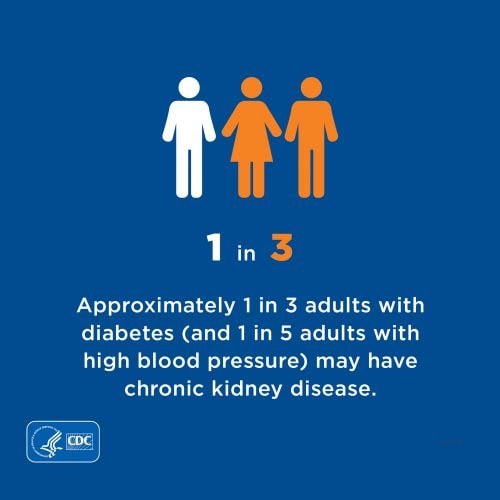
What You Should Know About Chronic Kidney Disease

Work with your health care team on a treatment plan that’s right for you.
Kidneys that function properly are important for maintaining good health. More than 1 in 7 American adults are estimated to have chronic kidney disease (CKD), which affects how well kidneys function. Find out what you should know if you are diagnosed with CKD.
Your kidneys work hard. Every 30 minutes, they filter all your blood to remove wastes, poisons, and excess fluid from your body. Kidneys also help control blood pressure and produce several vital hormones. Kidneys that function properly are important for maintaining good health.
CKD refers to the loss of kidney function over time. This means that the kidneys are not able to filter fluids as well as they should. The excess fluid and waste that aren’t filtered remain in the body. This may cause other health problems, including heart disease and stroke.
The two main causes of CKD are diabetes and high blood pressure. About 1 in 3 adults with diabetes and 1 in 5 adults with high blood pressure have CKD.
People may not feel sick or notice any symptoms until CKD is advanced. The only way people find out if they have CKD is through simple blood and urine tests. The blood test checks for creatinine (a waste product) in the blood to see how well the kidneys work. The urine test checks for protein in the urine (an early sign of kidney damage).
Don’t Delay
Work with your doctor to help monitor your kidney health and make a treatment plan that’s right for you. Your doctor may refer you to a kidney specialist (nephrologist). If you are diagnosed with stage 4 CKD, work with your health care team to learn about treatment options for kidney failure.
Know Your Kidney Numbers
Your kidney numbers include two tests:
- Estimated glomerular filtration rate (eGFR)—a measure of how much blood your kidneys filter each minute. This tells you how well they’re working. If your eGFR is low, your kidneys are not working as well as they should. As kidney disease progresses, your eGFR goes down.
- A urine test to check for albumin. Albumin is a protein that can pass into the urine when the kidneys are damaged. Too much albumin in your urine is an early sign of kidney damage.
Stages of CKD
There are five stages of CKD, with kidney failure as the final stage. When kidney damage is severe and kidney function is very low, you’ll need dialysis or a kidney transplant to live.

Take Care of Your Kidneys
Not all people with kidney disease progress to kidney failure. Follow these tips to help lower your risk for developing kidney failure:
- Keep your blood pressure below 140/90 (or the goal your doctor sets for you).
- If you have diabetes, stay in your blood sugar range as much as possible.
- Work with your health care team to monitor your kidney health.
- Take medicines as prescribed.
- Work with a dietitian to develop a kidney-healthy eating plan. If you have diabetes, find tips on how to eat well to manage both diabetes and CKD.
- Get active—physical activity helps control blood pressure and blood sugar levels. Learn about the many benefits of physical activity.
- Aim for a healthy weight. Find tips on maintaining a healthy weight.
- Understand how lack of sleep affects your health. Find more on sleep basics.
- If you smoke, quit. Smoking can worsen kidney disease and interfere with medication that lowers blood pressure. Find resources to help you quit.
- Mental health is an important part of your overall well-being. Find healthy ways to cope with stress and depression.
- Avoid conditions or exposures that can harm the kidneys or cause kidney function to suddenly get worse. Check with a doctor about what things you should avoid.
More Information
- Chronic Kidney Disease Basics
- Chronic Kidney Disease Surveillance System
- CDC’s Chronic Kidney Disease Initiative
- Chronic Kidney Disease in the United States, 2019
- Diabetes and Your Kidneys
- Make the Connection
- Estimated Glomerular Filtration Rate (eGFR)
- CDC Diabetes on Facebook
- @CDCDiabetes on Twitter





















.png)












No hay comentarios:
Publicar un comentario